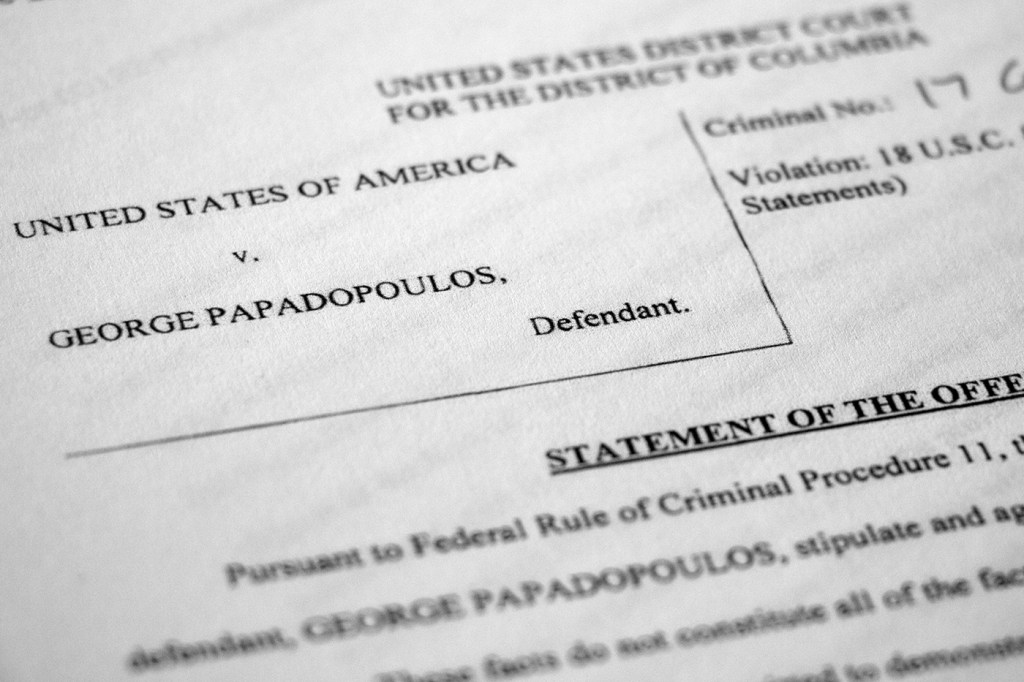George Papadopoulos’ cooperation likely just the first of many dominoes to fall

Mere hours after two former Trump aides were indicted on Monday came “the most important development” of the day, said Northeastern law professor Daniel Medwed—the announcement that George Papadopoulos, a former policy advisor to the Trump campaign, pleaded guilty to lying to the FBI.

Lying to a federal investigator carries a sentence of up to five years in prison. But due to his cooperation, Papadopoulos will instead face a maximum sentence of six months.
We asked Medwed about cooperating witnesses—whether they can be trusted and the prosecutorial strategy behind using them.
“Obviously he has something,” Medwed said, of Papadopoulos’ information pertinent to the case. “In order to get that kind of deal, he had to give authorities some sign of what he would say.”
First and foremost, what is cooperation, in a legal context?
Cooperation is very common in criminal cases generally, but especially in the federal system because of its harsh sentencing. The federal court system has minimum sentencing requirements, which means that if an individual is charged with a particular crime, the sentencing floor is quite severe. That creates incentive for people to flip, in exchange for leniency.
Cooperation is related to plea bargaining, in the sense that often the bargain for cooperation is either charge bargaining—negotiating for a less severe charge—or sentence bargaining—negotiating for a lower sentence. The basic idea, though, is that in exchange for giving information to the government, there’s a benefit related to your own criminal exposure.
We now know that Papadopoulos provided information. Could that information have led to the indictment of Paul Manafort, Jr. and Rick Gates?
We don’t know whether he provided information that helped in those indictments, but my instinct is that it was apples and oranges because the charges against Gates and Manafort relate to behavior that’s independent to Trump’s campaign. Papadopoulos’ charges tie him to the campaign, however.
So then, what’s the bigger prosecutorial strategy at play here?
There is some indication, and other media have commented on this, that this is a classic squeeze play, or a method of shaking the trees. The special counsel is charging people with legitimate crimes, but the question is what will come falling once you start negotiating with the people you’ve charged.
This is where things get dicey for other people in the Trump administration, because they don’t know exactly what Manafort and Gates could say. There are also other sealed indictments that have already been filed by prosecutors related to this case.
It’s important to think about this as the beginning of this process rather than the end. What often happens in these cases is that it feels like dominoes: Lesser figures are charged earlier on and as they begin to fall they take down larger players down the line. In theory, the dominoes keep falling until it goes all the way up to the person at the heart of the conspiracy.
Cooperating witnesses can also be crucial in cases involving sophisticated groups or where the theory is group criminality, because penetrating that group is going to be very hard without an insider.
Considering that witnesses generally cooperate for the sake of their own self-preservation, can we trust what they say?
Cooperating witnesses have notorious credibility problems for the obvious reason that they’re facing significant sentences. The more punishment you’re facing, the more likely it is that you’ll slant your testimony to please the prosecutors. It’s a bit like making a deal with the devil, because you’re working with people who are facing criminal charges themselves.
To combat this, what legal scholars advise, and what I hope would happen here, is that prosecutors independently try to corroborate the information. Prosecutors also have to disclose the benefits they’re offering to Papadopoulos, in this case. We know he was given leniency, but what else was he promised?
Beyond his own self-preservation, what’s the significance of Papadopoulos’ cooperation in this case?
The announcement changed the whole tenor of the day on Monday. It might be an omen of things to come, or it could signal to Manafort and Gates that maybe they should consider cooperating themselves.
In addition, there might have been people coming forward of their own volition Tuesday. You have a decent amount of leverage before you get indicted, so cooperating now before things get too hairy, like Papadopoulos did, means you’ll be better off later.
What it comes down to is that he has to have something for prosecutors to give him that deal. So, that’s causing a lot of consternation right now for people in the White House, not knowing what he said. I’m sure there were a lot of people going through their datebooks after the announcement, trying to figure out when they met, what they said, what he might have overheard.





